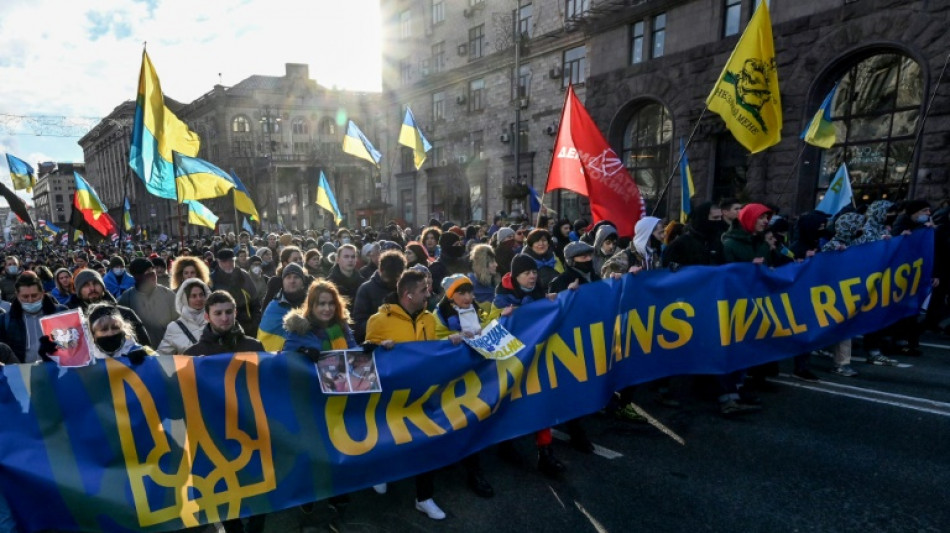
Biden, Putin discuss Ukraine as Kremlin slams 'provocations'

Russian leader Vladimir Putin on Saturday slammed Western claims of an imminent Moscow invasion of Ukraine as a "provocation" as he began new crisis talks with US President Joe Biden.
Weeks of tensions that have seen Russia surround its western neighbour with more than 100,000 troops intensified after Washington warned that an all-out invasion could begin "any day" and Russia launched its biggest naval drills in years across the Black Sea.
Russia's defence ministry added to the febrile atmosphere by announcing that it had chased off a US submarine that it alleged had crossed into its territorial waters near the Kuril Islands in the Pacific. The ministry said it had summoned the US defence attache in Moscow over the incident.
The military manoeuvres gave added urgency to a hastily arranged call Saturday between Biden and Putin aimed at defusing one of the gravest crises in East-West relations since the Cold War.
"President Biden's secure call with Russian President Putin convened" at 1604 GMT, a White House official told reporters.
Putin began his afternoon by holding talks with France's Emmanuel Macron that the French presidency said lasted one hour, 40 minutes.
Macron's office said "both expressed a desire to continue dialogue" but reported no clear progress.
The Kremlin said Putin told Macron that Western claims of a planned Russian invasion were "provocative speculation" and could spark a conflict in Ukraine.
- 'Possible provocations' -
Russia on Saturday added to the ominous tone by pulling some of its diplomatic staff out of Ukraine.
The foreign ministry in Moscow said its decision was prompted by fears of "possible provocations from the Kyiv regime".
But Washington and a host of European countries cited the growing threat of a Russian invasion as they called on their citizens to leave Ukraine as soon possible.
Britain and the United States also pulled out most of their remaining military advisers while the US embassy ordered "most" of its Kyiv staff to leave.
Dutch carrier KLM announced that it was suspending commercial flights to Ukraine until futher notice.
The prospect of frightened Westerners fleeing their country prompted Kyiv to issue an appeal to its citizens to "remain calm".
"Right now, the people's biggest enemy is panic," Ukrainian President Volodymyr Zelensky said on a visit to troops stationed near the Russian-annexed peninsula of Crimea.
Several thousands also braved the winter call to march through Kyiv in a show of unity in the face of the growing fears of war.
"Panic is useless," said student Maria Shcherbenko as the crowd waved Ukraine's blue-and-yellow flags and sang the national anthem. "We must unite and fight for independence."
- 'Any day now' -
Washington on Friday issued its most dire warning yet that Russia had assembled enough forces to launch a serious assault.
"Our view that military action could occur any day now, and could occur before the end of the Olympics, is only growing in terms of its robustness," US National Security Advisor Jake Sullivan warned.
US military assessments had earlier said the Kremlin may want to wait for the Beijing Winter Olympic Games to end on February 20 before launching an offensive so as not to offend Russia's ally China.
Ukrainian leaders have been trying to talk down the prospects of an all-out war because of the damaging effect it was having on the country's teetering economy and public morale.
But the mood across the country remained tense.
The mayor's office of Kyiv announced that it had prepared an emergency evacuation plan for the capital's three million residents as a precaution.
Sullivan stopped short on Friday of saying that the United States has concluded that Putin has made the decision to attack.
But some US and German media cited intelligence sources and officials as saying that a war could begin at some point after Putin concludes talks with German Chancellor Olaf Scholz in Moscow on Tuesday.
The German leader is due to travel to Kyiv on Monday and then visit Putin as part of Europe's efforts to keep lines of communication open with Moscow.
Russia is seeking binding security guarantees from the West that include a pledge to roll NATO forces out of eastern Europe and to never expand into Ukraine.
Washington has flatly rejected the demands while offering to discuss a new European disarmament agreement with Moscow.
Russia has called the US proposal woefully insufficient.
- 'Pivotal moment' -
The diplomatic push continued on Saturday with a new round of inconclusive talks between US Secretary of State Antony Blinken and Russian Foreign Minister Sergei Lavrov.
The State Department said Blinken told Lavrov that diplomatic channels "remained open" but required "Moscow to deescalate and engage in good-faith discussions".
Sullivan also repeated warnings that Russia risked severe Western sanctions and said that NATO is now "more cohesive, more purposeful, more dynamic than any time in recent memory".
Germany's Scholz has added his voice to European pledge to punish Russia with severe economic sanctions targeting its financial and energy sector if it attacks.
burs-zak/as/jm
(V.Sørensen--DTZ)
